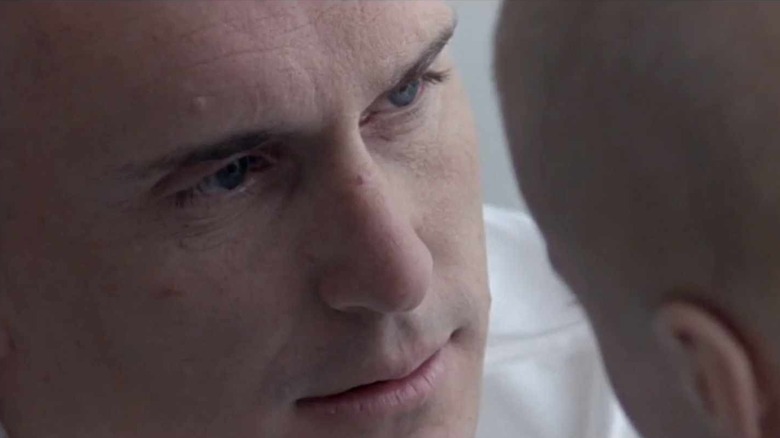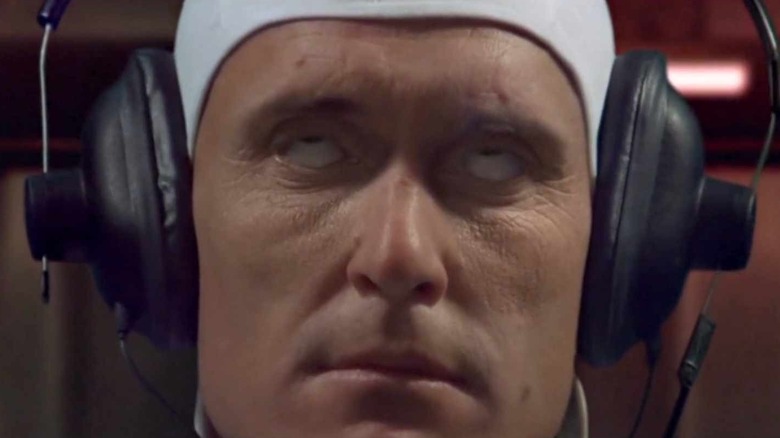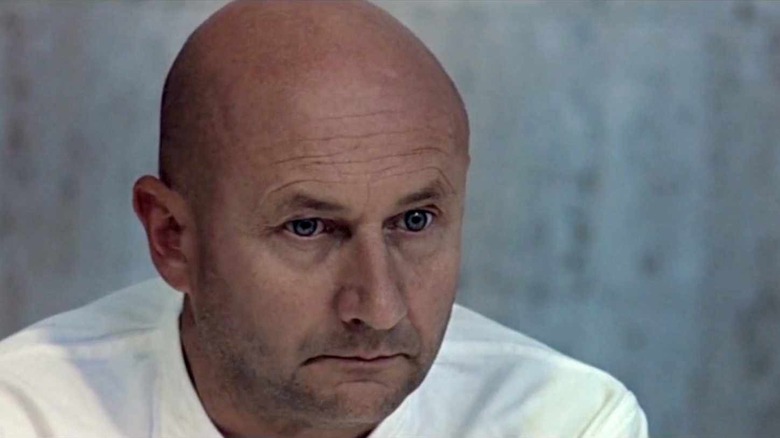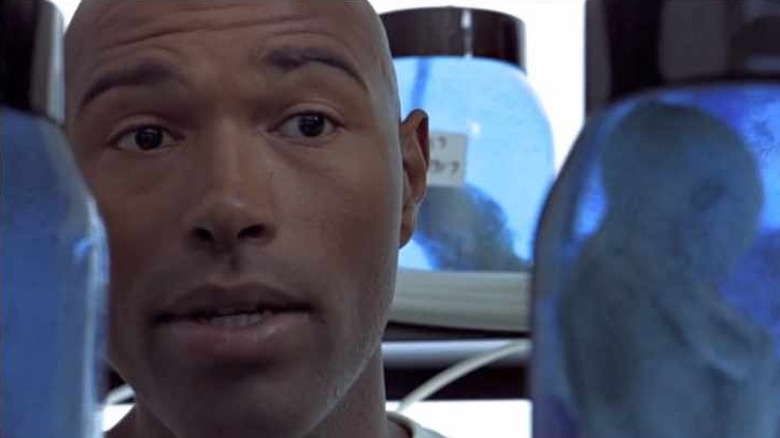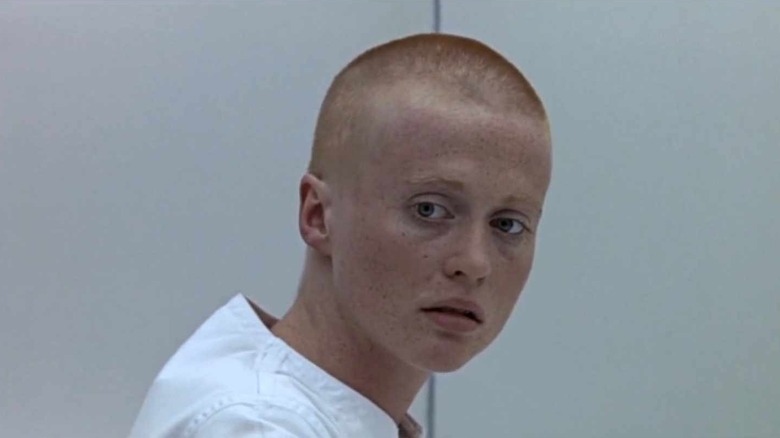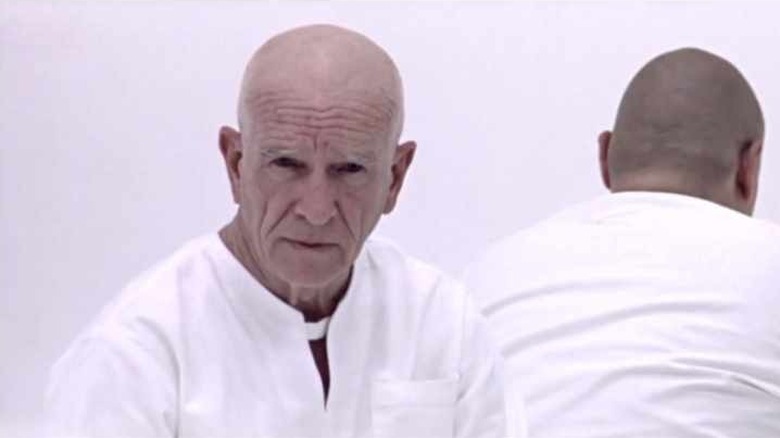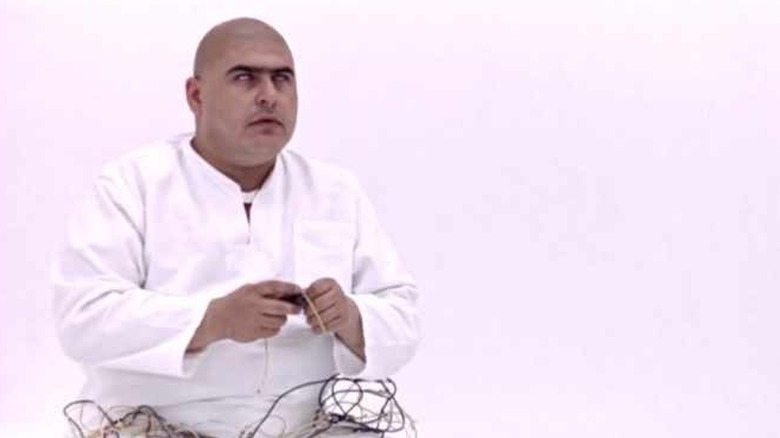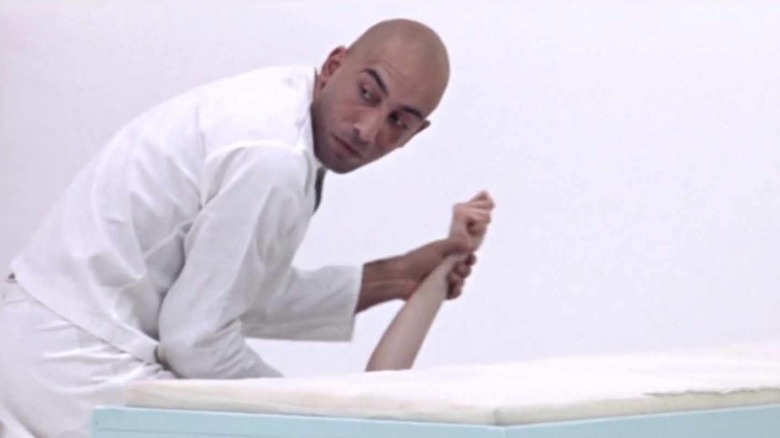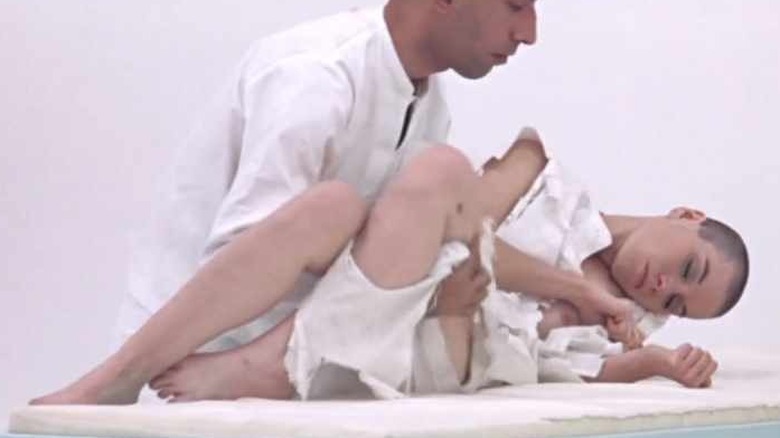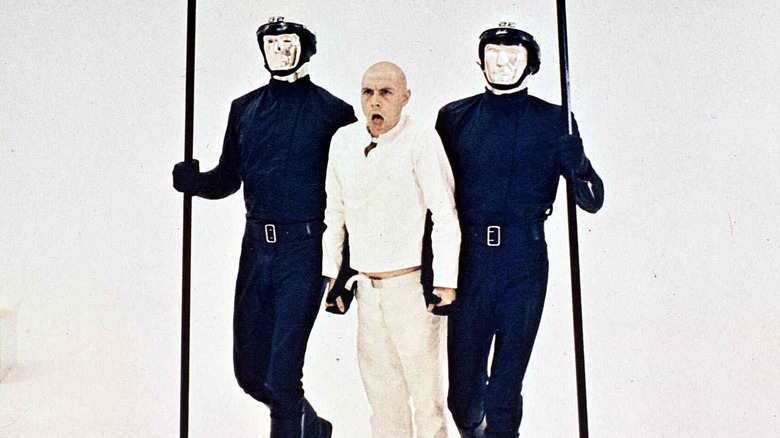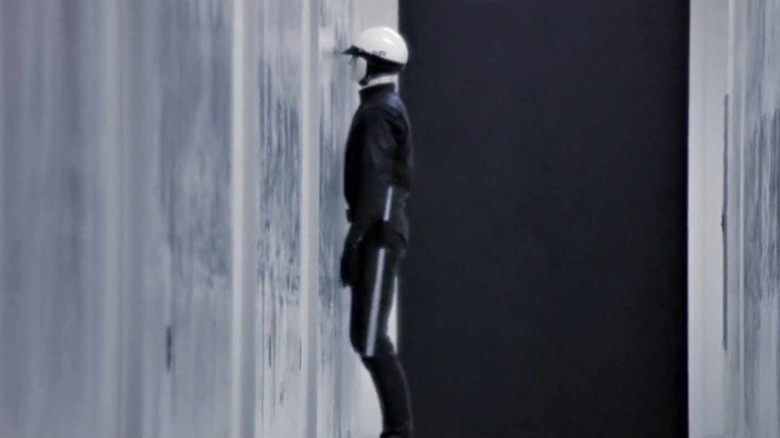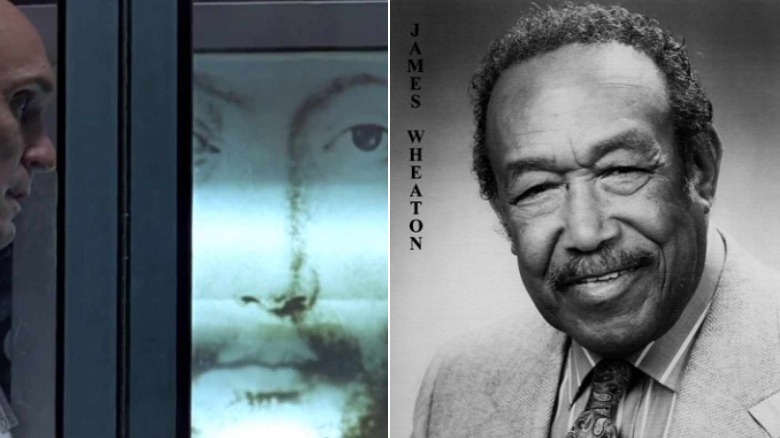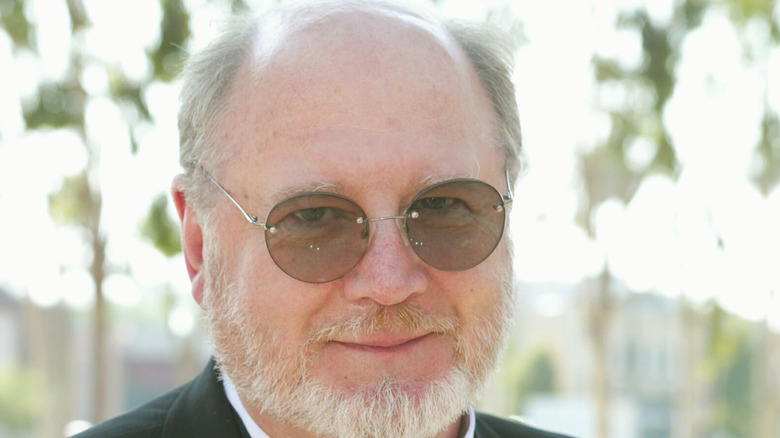Whatever Happened To The Cast Of George Lucas' First Film, THX 1138
Before George Lucas went galactic with "Star Wars," he was a USC film student, turning heads with his 1967 15-minute dystopian short "Electronic Labyrinth: THX 1138 4EB." It caught the eye of Francis Ford Coppola ,who got Warner Bros. to greenlight an expanded feature version at a budget of $777,000.77.
Lucas said "THX 1138" was "a contemporary story about today, and therefore I want to make it out of existing things, but everything is real, only altered slightly in order to give it kind of an alien look." He originally wanted to shoot in Japan, but he was able to achieve his vision closer to home, utilizing over 20 San Francisco-area locations, including the Marin County Civic Center and the soon-to-be opened BART.
When released in 1971 the reaction was mixed, with one reviewer saying the title was impossible to remember, "for those of us who are still relatively uncomputerized," but earns praise today from Steven Spielberg, who remembers it as "one of the greatest science-fiction movies I'd ever seen." The dark film only earned $2.4 million at the box office, but introduced the world to Lucas' cinematic mind, and was essential in the creation of his next two pop culture-redefining classics: "American Graffiti" and "Star Wars." The film would later loan out its name to a sound system co-developed by the director, as an entire generation came to know "THX" as the three letters that symbolized ear-splitting theater surround sound.
In order to capture the cerebral world of "THX 1138" and make it seem more human, Lucas leaned on skilled actors working for scale ... and willing to completely shave their heads. It was a hard ask, one that forced them to employ patients at the drug rehabilitation center Synanon to fill in the backgrounds of scenes. For the actors who braved this new world alongside the young George Lucas, it was quite the journey — now, as the film rolls past its 50th anniversary, let's see whatever happened to the cast of "THX 1138," a film that changed everything.
Robert Duvall (THX 1138)
When working on Coppola's 1969 film "The Rain People," Lucas had star Robert Duvall in mind for the title role of system disruptor THX 1138 even before he had finished the script for it. Duvall was game as he "liked the idea, because I hadn't played the lead in a movie." Shaving his head wouldn't be too much of a sacrifice for the hair-challenged actor, as he "knew I didn't have to go far anyway."
Duvall's impressive career includes a resume filled with beloved characters like Boo Radley in "To Kill A Mockingbird," Frank Burns in "M*A*S*H," Tom Hagen in Coppola's "Godfather" saga (as well as several more of his films, like "The Conversation" and "Apocalypse Now"), Frank Hackett in "Network," Max Mercy in "The Natural," Prendergast in "Falling Down," and General Robert E. Lee in "Gods and Generals."
He has also directed 5 films, including 1997's "The Apostle" (in which he also starred) ,for which he received a Best Actor Academy Award nomination. Duvall has also been a producer on such films as "Tender Mercies" (in which he played the lead country singer) and "Crazy Heart."
After a break of five years on screen, he recently returned, reuniting with his "Apocalypse" friend Martin Sheen for the "sanguine" 2021 film "12 Mighty Orphans." In 2021, Duvall celebrated his 90th birthday.
Donald Pleasence (SEN 5241)
When searching for his manipulative and mouthy SEN, Lucas wanted an actor comparable to Duvall's talents to play opposite him; casting supervisor Ronald Colby suggested prolific English actor Donald Pleasence. The pairing worked beautifully, although Lucas said that while Duvall was always prepared for a scene, Pleasence "didn't even bother to read his lines until about the third take." The actor only had nice things to say about his director, "It was an enjoyable film to make. Even at that point, I had a feeling George Lucas would go on to do some wonderful things. Technically, he knew everything about the business at a very young age."
Pleasence would cross paths with Duvall again four years later, playing Heinrich Himmler in "The Eagle Has Landed." He also would cross paths with many actors, genres, and mediums in an impressive career that lasted 5 decades. He made audiences take notice in Harold Pinter's play "The Caretaker," he made Bond "Only Live Twice" as baddie Ernst Stavro Blofeld, he made forgeries in "The Great Escape" (he was an actual POW during WWII), and tried to make sense of Michael Myers as Dr. Samuel Loomis in five "Halloween" pictures. His incredible list of roles goes on and on, with 240 of them tackled in front of the camera. As he once simply said, "I like to work."
Pleasence died unexpectedly in 1995, at age 75. In a boundary-breaking postscript, he would release another film more than a quarter century after his death — well, sort of. Using a stunt double and some measure of digital and practical trickery, a version of Pleasence appears in the 2021 Michael Myers film "Halloween Kills."
Don Pedro Colley (SRT 5752)
After auditioning "every black actor in San Francisco" with no luck, Duvall suggested his 6-foot-4-inch flag football buddy from Hollywood Don Pedro Colley, who ended up with the role of hologram actor SRT. Colley could tell that Lucas was not comfortable working with actors, so he and his fellow thespians tried to push their director to let them "breathe life into these characters."
Colley originally had different aims in life. He failed to make the 1960 Olympic team as a discus thrower, and once studied architecture before pursuing the craft that would let him stand out even more than his tall physique. He broke into the industry performing in several late '60s western TV shows, and had a four episode stint on "Daniel Boone" as Gideon. He went on to shine in films like "Beneath the Planet of the Apes," "Black Caesar," "Sugar Hill," and "Herbie Rides Again." He is perhaps best known for playing a thorn in the side of the "Dukes of Hazzard" as neighboring county Sheriff "Big Ed" Little.
Due to his participation in multiple cult films and popular television shows, he was a frequent participant in fan events, where he was happy to share stories and take photos with fans. One of his final appearances was at Cooter's Last Stand 2017, the same year Colley died after a long battle with cancer at age 79.
Maggie McOmie (LUH 3417)
Lucas and casting supervisor Ronald Colby were having a lot of difficulty finding an actress to say "yes" to the role of LUH; the whole having to shave your head for a pittance thing wasn't helping their cause. After catching Maggie McOmie in a local production of "Marat/Sade," Colby was taken with her "very haunting quality that I thought would be appropriate for someone living in a subterranean world." McOmie said simply that "they liked my face," and was so overwhelmed at getting the part in a studio film that the thought of "getting my hair cut off was sort of secondary."
What was seen as a breakout role for McOmie turned out to be a breakaway from the industry. For the rest of the 20th century she would appear in only two short films and one feature, 1975's "Reflections of Passion." She didn't resurface in the public eye until 1992, the year Sigourney Weaver shaved her head and reprised the role of Ripley for "Alien 3." When profiled for the L.A. Times, McOmie wrote the paper a letter to share in Weaver's "excitement at being bald and 'out there' for science fiction." The letter's author updated her status, saying "after taking several years off to raise her daughter, McOmie is again working as an actress and is now writing a screenplay."
She eventually added new credits to her resume with 2006's "The Boston Strangler" and "Grand Junction," followed by two short films in the following years.
McOmie hasn't forgotten her past, as she happily appeared alongside her director and castmates for a 2004 screening of the director's cut of "THX."
In 2021, McOmie turned 80 years old.
Ian Wolfe (PTO)
PTO is the eldest prisoner stuck in the infinite white room, and the man who played him, Ian Wolfe (born in 1896), was the eldest member of the cast. Every time a new prisoner arrives, PTO gives the same "mumblings of an old man," about how to temper one's anxiety and rage, and instead observe one's surroundings, much to the dismay of SEN's irritable ears.
Imagine observing the surroundings Wolfe must have seen as an actor in close to 200 films and 100 TV shows, starting with 1934's "The Fountain" and ending with 1990's "Dick Tracy." In between, he worked with revered directors like Alfred Hitchcock, Frank Capra, William Wyler, Stanley Donen and Billy Wilder, and supported such movie stars as Clark Gable, Marlene Dietrich, James Dean, Charles Laughton, and Harrison Ford.
The Illinois native was rather candid about his vocation, stating it wasn't at all a glamorous way to make a living, as he continually struggled to provide food for himself and his family. As a character actor, he knew his place in the pecking order, once telling the Los Angeles Times, "I was the dust that made them twinkle," and that his "claim to fame" in the industry was "that I have survived."
Wolfe lived to be 95, and passed away in 1992.
Marshall Efron (TWA)
In Lucas' script for "THX 1138,” the grabby prisoner TWA was described as "a rather fat man in his thirties." That description helped Marshall Efron, Berkeley graduate (and "the round Mercury of Hip California" mentioned in Tom Wolfe's book "The Electric Kool-Aid Acid Test" about Ken Kesey and the Merry Pranksters) turned teacher turned actor, land the role. Two years later, in New York, Efron presented a screenplay award to his director, who had won for his much more commercial "American Graffiti." The last professional encounter between the two would be when Efron was the voice of Synonamess in the Lucas executive produced 1983 cartoon, "Twice Upon a Time."
Efron's voice was heard on many a 1980s Saturday morning cartoons, from "The Smurfs," "Shirt Tales," "The Biskitts," and "The Transformers" to "The Snorks." However, the witty humorist's greatest contribution to the medium was two short-lived, highly influential programs, PBS' "The Great American Dream Machine" (John Lennon was a big fan of the show, which guest starred the likes of Kurt Vonnegut, Chevy Chase, Studs Terkel and Albert Brooks) and CBS' "Illustrated, Simplified and Painless Sunday School," where Efron re-enacted Bible stories by his lonesome.
Efron died of cardiac arrest in 2019, at age 81. It is unclear what his famous last words were, but he did leave us with this handy guide so we could write some for ourselves.
Sid Haig (NCH)
Sid Haig didn't even have to audition to land the role of NCH — to get into character, he searched within, basing the rambunctious NCH "on my own insanity." In a small amount of screen time he was "raping the girl [IMM, Irene Cagen below] twice, punching Donald Pleasence [SEN] in the nose, and destroying the robot — who gets to do that?"
Sidney Eddie Mosesian made quite a scene in a career that spanned almost 60 years. The beady-eyed, bearded wonder played a heavy in classic '60s shows like "Batman," "Star Trek," "Get Smart" and "Gunsmoke," and later popped up on "Mary Hartman, Mary Hartman," "Buck Rogers" and "The Fall Guy," just to name a few.
Work in film picked up in the 1970s, racking up credits alongside James Bond in "Diamonds Are Forever," and a slew of blaxploitation films like "Coffy" and "Foxy Brown." Quentin Tarantino liked what he saw and re-teamed Haig with Pam Grier for 1997's "Jackie Brown," and again hired him for "Kill Bill: Vol 2." Musician-turned-filmmaker Rob Zombie was also a fan, employing his scare tactics for 5 films and turning Haig into a leading man with his Captain Spaulding character, who debuted in 2003's "House of 1000 Corpses."
Haig became a popular figure on the convention circuit, and his friend and fellow conventioneer Cassandra Peterson (aka Elvira) said that his monster persona "took fans by surprise when he was sweet and took time with them" in real life.
He died in 2019, at age 80.
Irene Cagen as Irene Forrest (IMM)
When Irene Forrest was having her head shaved (as documented in "Bald: The Making of 'THX 1138'"), her emotions ran the gamut from being wowed to being scared. This range helped her to later get into character to play IMM, whose raw outpouring after being raped by NCH (Sid Haig above) is one of the more jarring scenes in the film.
The Brooklynite had a decent career as an actress, appearing in the TV series "Fame," "Life Goes On," and "L.A. Law," and films like "Sitting Ducks" (which earned her a best supporting actress award nomination by the National Association of Film Critics Award), "Ricochet," and "Wolf." Beginning in the 1980s, she achieved even greater success as a casting agent, credited under the name Irene Cagen. Her eye for talent stocked shows such as "My Two Dads," "Alien Nation," "The 4400," and "Crash," and films like "Playing By Heart" and "Masked and Anonymous." Cagen also taught the craft to others in Los Angeles and Portland.
After a year-long battle with a brain tumor, Cagen Forrest died in 2010 at age 65.
Robert Feero (Chrome Robot)
Robert Feero had two uncredited roles in 1967: "A Covenant with Death" and "Cool Hand Luke," before earning his Screen Actors Guild card for his first official film four years later, "THX 1138." He had two roles in the film, one as "merely a nuclear powered chrome robot" and the other as "the guy who puts the mind lock on Robert Duvall."
As a robot, he had trouble seeing out of his mask, running into a wall during filming. This incident inspired Lucas to later film a scene of a chrome officer doing just that, but instead of him, Johnny Weissmuller Jr. got the honor, "which kind of irked" Ferro "at the time." He and Weissmuller would both later collaborate in 1973's "Magnum Force" and a play about Teddy Roosevelt in 1976.
Feero went on to a career mainly within the confines of a television set. Shows such as "The Streets or San Francisco," "The Bionic Woman," "Battlestar Galactica," "The Incredible Hulk," "Simon & Simon," "Magnum, P.I." and "Knight Rider" listed him as a guest star. He worked with Fred Astaire, Lillian Gish and O.J. Simpson. His final role was in the 2009 film "One Way to Valhalla."
Feero died in 2011 at age 66.
Johnny Weissmuller Jr (Chrome Robot)
"Tarzan, My Father" is a 2002 memoir that Johnny Weissmuller Jr. wrote about his famous Hollywood star and Olympic swimmer senior patriarch. It was only fitting that Junior followed in his footsteps by diving into similar swimming and talent pools.
George Lucas made good use of his physique three times: first as a Chrome Robot alongside Robert Feero, then as a "badass" in his follow-up "American Graffiti," and lastly as a card player in the post-"Star Wars" trilogy TV movie "Ewoks: The Battle of Endor."
The San Francisco-based actor was also a former Navy man who worked as a longshoreman and enjoyed yacht races. In addition to the aforementioned memoir about his father, he appeared in several documentaries about him. Weissmuller aped his own heritage by providing his voice, alongside Christopher Guest, Bill Murray and John Belushi, in the English dubbed version of the first foreign-animated film to be rated X, 1975's "Tarzoon: Shame of the Jungle."
Weissmuller died in 2006 of liver cancer, at age 65. He passed away in the same hospital he was born in, California Pacific Medical Center.
James Wheaton (voice of OMM 0000)
Every totalitarian society needs its Big Brother spewing dogma, and in the world of "THX 1138" OMM 0000 is that omniscient, God-like voice, with the face of Hans Memling's 1948 painting, "Christ Giving His Blessing." Undocumented rumors say that Warner Bros. wanted Orson Welles for the role, but James Wheaton's calm and collected voice is the one we hear say capitalistic things like, "Let us be thankful we have commerce. Buy more. Buy more now. Buy. And be happy."
Wheaton's TV and film work center around a dozen credits from the '70s, including caretaker Nelson B. Davis on "Sanford and Son," multiple roles on "Good Times," and appearances on "Kojak," "Ironside," and "What's Happening!!" One of his later in life roles would be as a parole officer in the 1992 Drew Barrymore film "Guncrazy."
Perhaps not as well known was his dedication to the stage. The Columbia University grad student, and later professor of drama at California State College, worked as both an actor and director for Los Angeles' Ebony Showcase Theatre, once staging an African-American version of "The Odd Couple." Wheaton also was once noted for "the distinction of being the first Black director in the history of dinner theatre in Dallas."
Wheaton died in 2002, at age 78.
David Ogden Stiers as David Ogden Steers (Announcer)
Heard, but not seen, David Ogden Stiers announced his presence to the film world as an announcer in "THX 1138." That same year, he was seen and heard in someone else's feature directorial debut: Jack Nicholson's "Drive, He Said."
The Peoria, Illinois native, who went to high school with Roger Ebert, honed his craft in California in the 1960s before studying at Juilliard. After his busy 1971 in film, he took to Broadway, before becoming a household fixture when he joined the cast of the "M*A*S*H" TV series as Major Charles Emerson Winchester, III, M.D. That role would earn him two Emmy nominations, and he would add a third for playing the founder of the United States Olympic Committee in the 1984 mini-series "The First Olympics: Athens 1896."
Stiers was a dependable actor on screen, having appeared in five Woody Allen pictures, as well as films like "Better Off Dead" and "The Majestic." His vocal talents brought warmth to a varied set of projects, including Ric Burns' acclaimed "New York” documentary. Disney often called upon him, making him perhaps best known as Cogsworth the clock in "Beauty and the Beast." Because Stiers worked for the House of Mouse and other family-oriented fare, he held off for a long time from announcing to the public that he was gay.
In 2006, he and Lucas joined forces one last time, appearing on the same bill for that year's "Kennedy Center Honors."
Stiers died of bladder cancer in 2018 at age 75.
